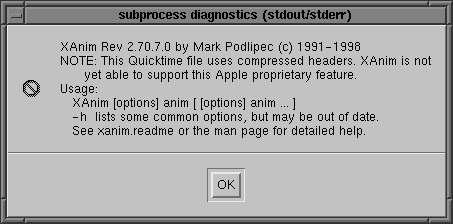Accessibility Issues: Media PoliticsHow can Linux challenge Windows and MacOS if entertainment content is provided in formats that can't be used under Linux? Whether it be DVD encryption or simply multi-media file formats, the prospects for a popular, non-corporately controlled operating system are diminished by adoption of technologies that require commercial licensing. Even if media corporations elect to endorse these exclusive delivery mechanisms, does it follow that artists will do the same?Microsoft forced Avery Lee, a free software developer to revoke support for the ASF format from his "VirtualDub" GPL-ed video editing/capture program. Here is Mr. Lee's description of his encounter with Microsoft (from Advogato article, referenced below): "Today I received a polite phone call from a fellow at Microsoft who works in the Windows Media group. He informed me that Microsoft has intellectual property rights on the ASF format and told me that, although I had reverse engineered it, the implementation was still illegal since it infringed on Microsoft patents."Linux World News aptly commented on the effect of file-format patents on the future of free software (article referenced below): "Microsoft is claiming patent protection on a file format. It is not at all hard to see what could happen with an extension of that claim. Any serious word processor in the commercial world has to be able to cope, somehow, with the numerous variations of Microsoft's Word format. If that format were to come under patent protection, programs like StarOffice, ApplixWare, and WordPerfect could lose the ability to work with Word files. That would not bode well for their future market share. Intellectual property laws increasingly look like the tool of choice for those who wish to fight against free software. The ability to patent file formats, if it stands up, adds greatly to the power of this weapon. This is a worrisome development indeed." (source)

By contrast, Java is available under all the commonly used operating systems. Despite Microsoft's efforts to complicate the use of this "middleware" technology, Java can be used by almost anyone with a personal computer. Systems administrators, content developers, and computers users should take this into account when comparing the merits of various Web technologies. |
| Jan. 9th, 2001 correspondence |
|---|
hi andy happy new year. have you seen the "010101" sfmoma site? http://010101.sfmoma.org/start.html i don't know how you feel about flash and all that, (this is flash-y), but nonetheless, it's nice. ¡ fran ! |
hi fran, well, in a nutshell, i'm opposed. a. quicktime not available for linux b. shockwave 5 not available for linux if you're not getting the picture, let me spell it out very briefly: art museum forces public to use microsoft windows or mac OS, which is partially owned by bill gates anyway this is a recipe for media cultural commercialism without an exit. so i oppose it. a |